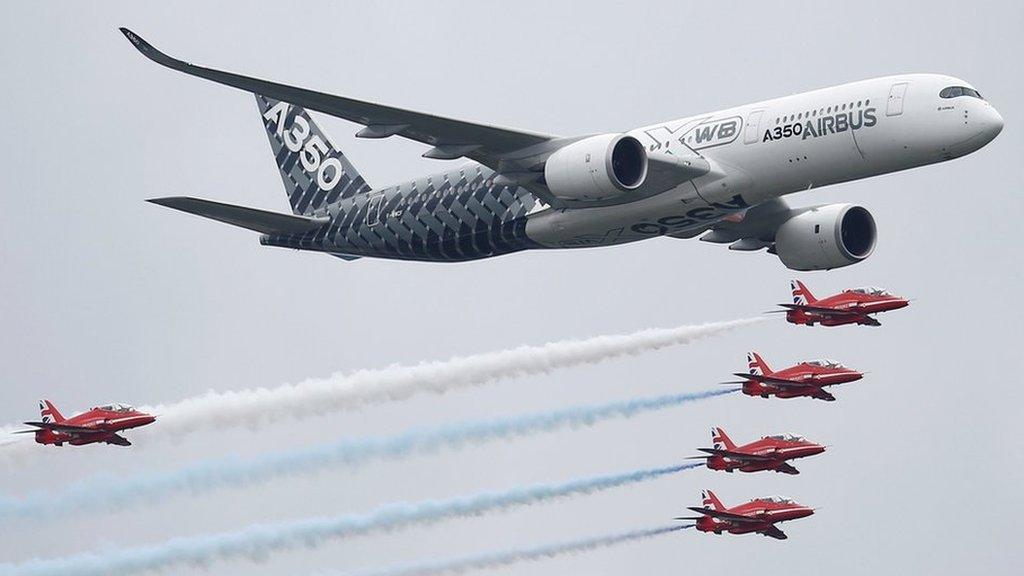Farnborough Airshow: Brexit and bulging order books dominate
- Published
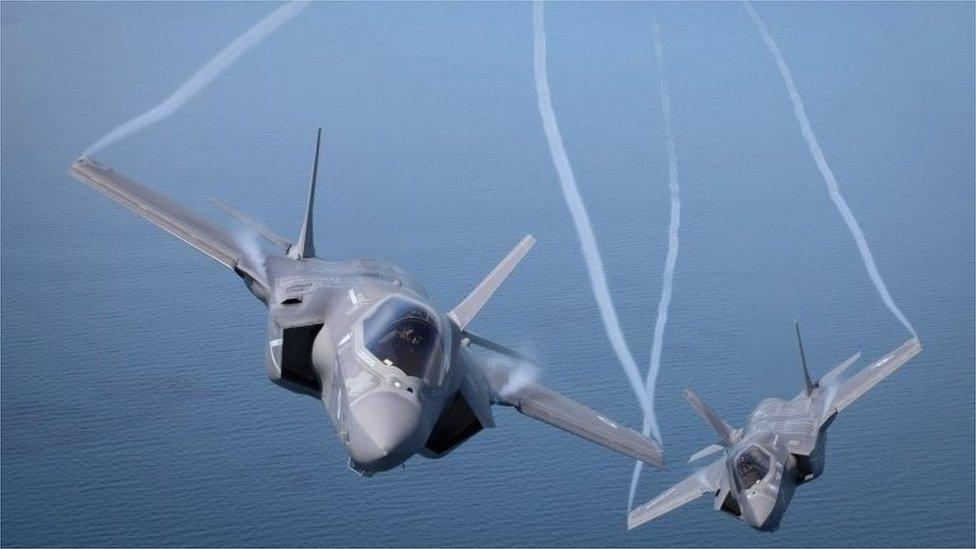
US-made F-35B fighter jets will be jointly operated by the Royal Navy and RAF.
The weather forecast may be warm and sunny, but there is still likely to be a cloud hanging over the Farnborough Airshow this week.
The show is the biggest event of the year for the aerospace industry. It's where the latest multi-billion-dollar fighters and sleek airliners soar through the skies.
However, on trade days - which kick-off the show before Farnborough opens its door to the general public - the air display itself is merely a distraction.
The show attracts about 100,000 trade visitors from 100 countries. The focus is on networking and doing deals - at the last Farnborough Airshow, in 2016, those deals were worth $124bn (£95bn).
For aerospace companies in Britain, the event is a vital shop window.
But this year fears about the future after Brexit are looming, and for many people will dominate gossip in the plush chalets and meeting rooms.
Paul Everitt is head of ADS Group, which represents the UK aerospace, defence and space sectors. He insists that any failure to agree a good deal on Brexit will hurt the sector.
"If the costs of operating in the UK become higher, then our ability to attract new investment will be diminished", he says.
The current uncertainty is already taking its toll, he thinks.
"We are a long term industry. When a big investment decision comes along we are not in such a good place. If it continues we could see an erosion of our position."
ADS has welcomed the government's White Paper, published on Thursday, which it says represents good progress; but it insists there are important and complex issues still to be resolved.
Such concern isn't just being felt among the big players. Many of the smaller suppliers which throng the exhibition halls at Farnborough will also be wondering what the future will bring.
The government, however, may go some way to answering such questions this week.
On Monday, a major announcement is expected from the Ministry of Defence, setting out details of its Combat Air Strategy.
It is expected to explain its plans for developing and building new fighter aircraft from the 2020s onwards - when production of the Eurofighter Typhoon is likely to be wound down - and protecting the capabilities of the UK defence sector.
Research funding
There may also be an announcement from the government on which of eight possible sites will become home to the UK's first spaceport.
The ambition for the spaceport is that it becomes a hub for the UK commercialism of the space sector, through such things as satellite launches and tourism.
There is also talk that the UK may use Farnborough to unveil research funding for aerospace technologies, including for electric-powered aviation projects.
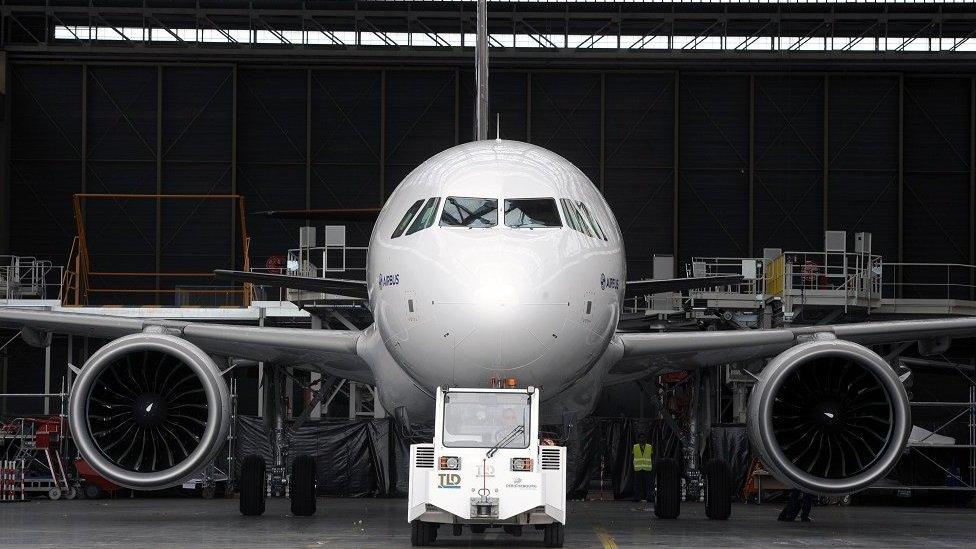
Airbus is hoping for more sales of its A320
Brexit aside though, the commercial aviation industry seems to be in rude health. Both Boeing and Airbus already have very full order books, and demand is unlikely to slacken.
Forecasts published in recent days, by Airbus itself and by the aviation intelligence group FlightGlobal, suggest that the aircraft fleet will more or less double over the next two decades - driven largely by rising demand in the Asia-Pacific region.
At Farnborough, orders could be placed for up to 900 new aircraft, according to analysts at the aviation consultancy IBA Group. The majority will be for variants of the Airbus A320 and the Boeing 737 MAX.
Nevertheless, the smaller end of the market is likely to be generating more interest than usual.
Airbus recently took a majority stake in Bombardier's C-series programme, rescuing the Canadian manufacturer from financial turmoil.
Boeing responded by agreeing a preliminary deal to take control of rival Embraer's commercial jet programme - although it has yet to be finalised.
Both will have their new toys on display at the show. Airbus has rechristened the C-series as the Airbus A220 and painted it in corporate colours.
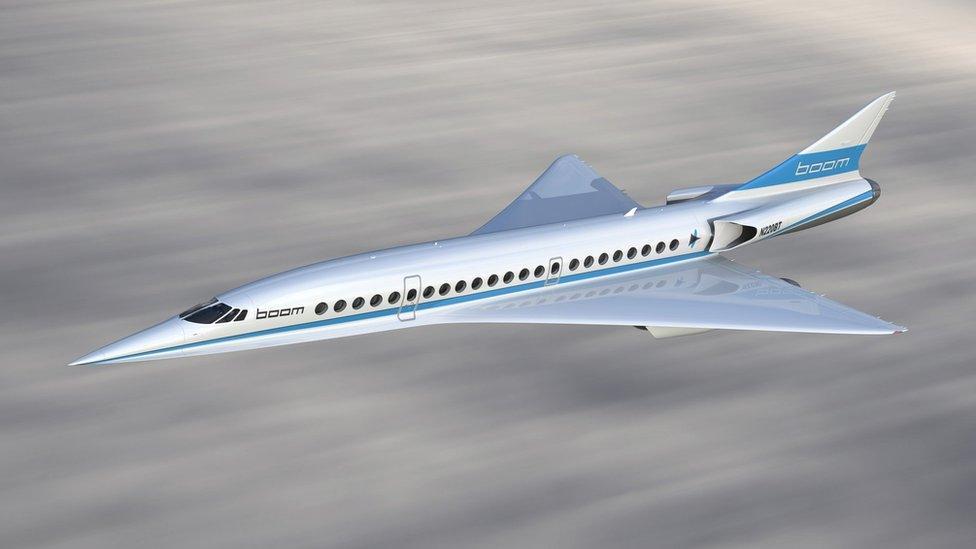
Boom plans to update potentially buyers of its planned supersonic aircraft
Embraer, meanwhile, will be showing off its E-190 E2, a similar, highly-efficient regional airliner, which entered into service earlier this year. Orders for the two aircraft types have been sluggish - but with the marketing clout of the aerospace giants behind them, that could change.
Elsewhere at Farnborough, there will be plenty of talk about the future.
Concorde may have stopped flying in 2003, but several companies now have ambitious plans for a successor.
Last month, Boeing unveiled its vision for a "hypersonic" airliner capable of flying at five times the speed of sound. That concept is expected to form part of an elaborate exhibit at Farnborough dedicated to how the industry will change in years to come.
Denver-based Boom Supersonic will also be present. The company is working on a small supersonic aircraft, which it plans to begin flying next year.
Boom hopes to have a 55-seat aircraft carrying passengers across the Atlantic by the mid-2020s. Its chief executive, Blake Scholl, will be among the keynote speakers at a conference taking place during the show.
US hardware
Autonomous aircraft and urban air taxis, cybersecurity and advanced manufacturing are other issues which are likely to be the subject of animated conversations.
An entire pavilion has been set aside to show off innovative technologies, under the catchy title of Aerospace 4.0.
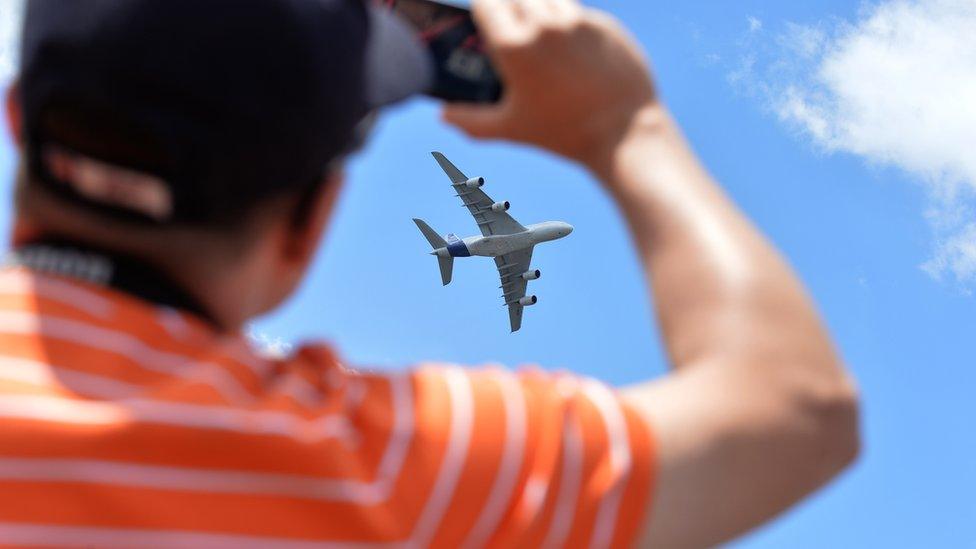
Almost £100bn worth of deals were announced at the last Farnborough show, in 2016
The US defence industry will be out in force at the show.
The Trump administration is not merely keen for NATO members to spend more on their military; it also wants them to buy American weapons.
"Even with the NATO debacle, Eastern European countries are increasingly willing to buy US hardware", says Francis Tusa, editor of Defence Analysis.
"In part it's because of the implicit security guarantees from the US that it brings. And these are some of the countries that are raising their defence budgets the fastest," he said.
So for a few days, a relatively quiet airfield in Hampshire will become the beating heart of the global aerospace industry. And as the fighters scream through the air, businesses will be seeking orders that will send money pouring into their coffers.
- Published10 July 2018
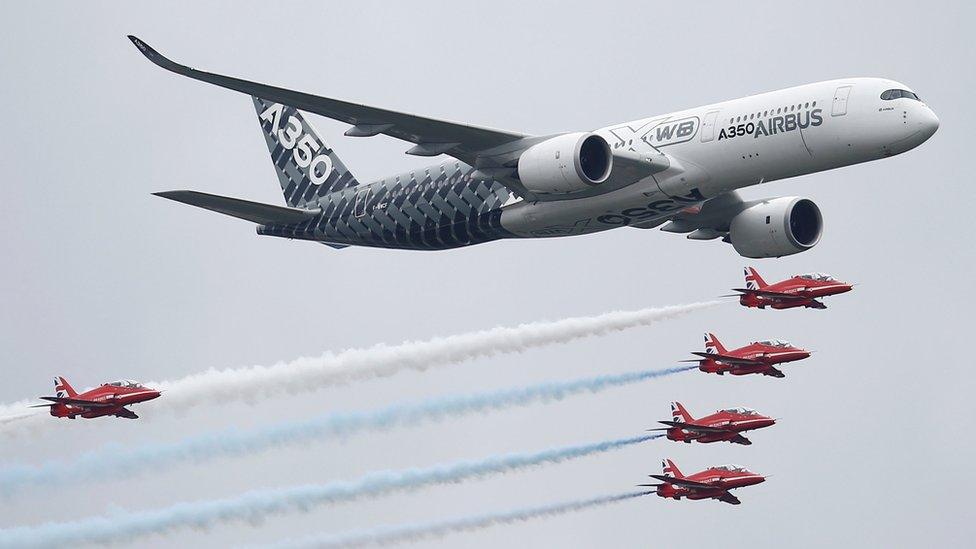
- Published6 July 2018
